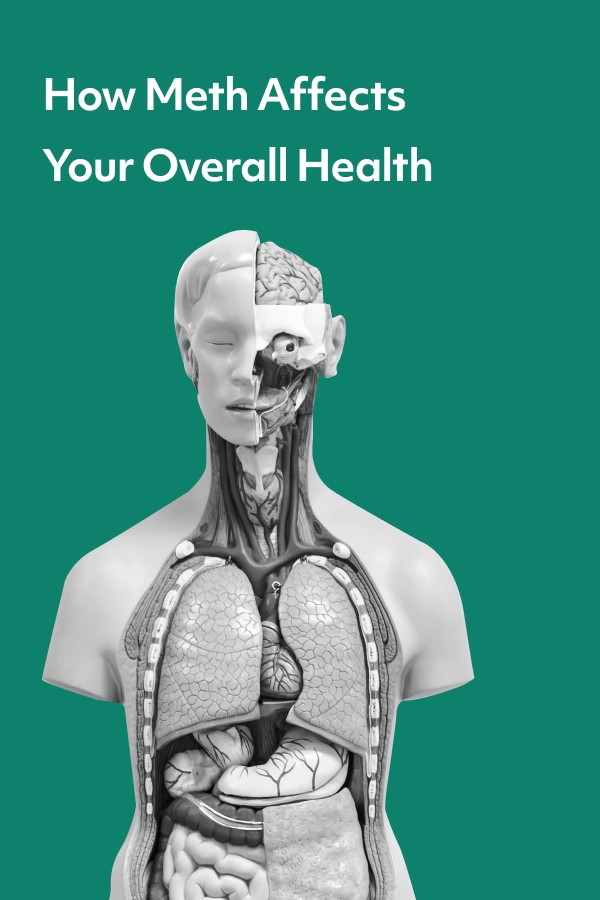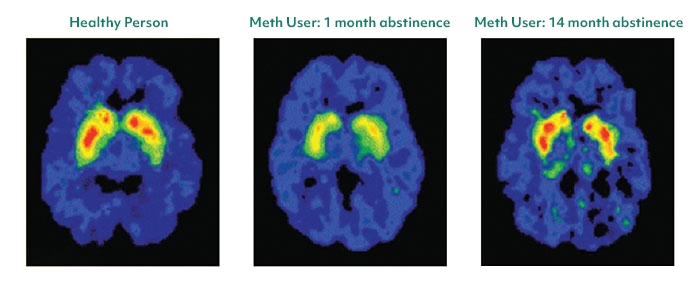Methamphetamine use affects physical health in a lot of different ways. Here’s a look at how using meth affects overall health.
We talk a lot about the dangers of addiction: The social consequences, like losing friends and hurting loved ones. The financial consequences, as the cost of drugs goes up and income goes down. And the legal consequences, as substance use often leads to behaviors that have legal repercussions and illicit drug use can carry high penalties.
But in focusing on these (often serious) risks of addiction as a whole, we don’t want to downplay with direct and indirect impact substances have on physical health. Today we want to talk about meth, and the ways it affects the overall health of the people who use it.
Short-term effects of meth on physical health
There are side effects and physical consequences of using methamphetamine that can arise early on, even the first time a person uses. These short-term effects of meth use include:
- insomnia
- decreased appetite
- rapid breathing
- rapid/irregular heartbeat (arrhythmia)
- high blood pressure
- increase in body temperature
Meth overdose can also occur after even one use of meth, and is deadly. The rate of meth overdose deaths tripled between 2015-2019. Polysubstance overdoses—overdoses in which meth was one of several substances used—are also on the rise.
Long-term effects on physical health
Over time, using meth has long-term effect on the body. One serious complication is the way it affects cardiovascular health. Using methamphetamines can cause heart damage, high blood pressure, and increased risk of stroke. It has been reported that methamphetamine use is contributing to rising rates of heart failure.
Smoking meth can damage the lungs, and is related to lung injury. Like many drugs, meth can also lead to problems for the liver and kidneys. Liver failure can be fatal, and liver damage can affect quality of life. Kidney damage from meth can cause pain, urinary tract infections, and kidney failure. Using meth can also impair the immune system, leaving those who use the drug susceptible to illness and infection.
The organs and systems listed above are vital, and damage to them has major implications for overall wellness, sometimes for years after use ends.
Meth and the brain
As we discussed in our post Meth and Mental Health, using meth causes real, measurable changes in the brain. Through neuroimaging, we can see the impact methamphetamines have on the dopamine system. This can lead to impaired cognitive function and motor skills. Long-term meth use can also have an observable impact on the structure and function of the parts of the brain that regulate emotion and memory. There is some evidence that it also alters the structures in the brain that are used in decision-making and that allow people to reduce or stop negative habitual behaviors.
These changes within the brain can lead to mood swings, anxiety, insomnia, and confusion. They can affect the ability to make decisions and take future consequences into account. They can also lead to symptoms of psychosis, like paranoia and hallucinations, which can last even well past when a person has quit using meth.
Meth affects dental health
One of the things that members of the general public often know about meth is that it can cause dental problems. Dentists use the phrase “methamphetamine-induced caries,” but the common term is “meth mouth.” This is a condition characterized by tooth decay (caused by the acidity of meth, consumption of carbs and sugars, lapsed oral hygiene, and frequent vomiting), dry mouth (a direct side effect of using meth and a contributing factor in the tooth decay), and excessive tooth-wear or broken teeth (caused by grinding teeth).
Once this condition becomes advanced, the affected teeth often can’t be salvaged and must be drawn. Many who suffer from meth-related dental issues feel stigmatized and ashamed, but dentists and oral surgeons can help with mitigating damage while that is possible and with implants or dentures if the damage is too advanced. Beyond social or aesthetic concerns, though, dental issues are real health issues. Mouth health can impact what a person is able to eat, and tooth decay can lead to dangerous infections that can spread through the body.
Related health risks
There are other health concerns for which using methamphetamine is a risk factor, rather than a direct cause. For example, using meth increases the likelihood of risky sexual behavior. Rates of sexually transmitted infections (STIs) go up among those who use meth, including HIV and hepatitis C. This has been primarily studied amongst men who have sex with men, but it is a hazard in all populations who use the substance.
Skin lesions and abscesses are a related health concern that is often cited as a sign to look for in someone who uses meth. They come about when people who use meth experience an itching, creeping sensation on the skin, which causes them to scratch and pick at it. Over time, this picking behavior can lead to scarring and infections.
Health in recovery from meth
So far, this article has been pretty heavy. And for good reason: meth poses a serious threat to the health of the people who use it. But there is some good news. Not all of the damage caused by using methamphetamines is permanent. Studies have found that the brain heals and adapts from much of the damage done by meth after a long enough period of abstinence. The image below shows how a brain’s ability to process dopamine (red and green) recovers over time.
Motor control also recovers. Some types of heart damage caused by meth are also reversible over time. Depending upon how early it is caught and other risk factors, meth-related kidney damage may be treatable. The liver is uniquely able to regenerate, so if a person stops using meth before permanent liver damage occurs, it has a chance to heal itself.
Other conditions are treatable once a person stops using. For example, hepatitis C is curable for most people with a course of oral medication. HIV can be managed for many with adherence to a retroviral regime. Skin lesions and abscesses can and do heal with treatment and lack of further irritation.
The important thing in all of these cases is to stop using as early as possible so the damage has the best chance to heal and treatments have the highest success rates. You don’t have to hit some dramatic rock bottom to deserve recovery from meth! You can start now, and begin the path to better health.










